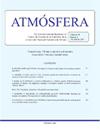Spatio-temporal co-variability of air pollutants and meteorological variables over Haqel and Jeddah, Saudi Arabia
IF 1
4区 地球科学
Q4 METEOROLOGY & ATMOSPHERIC SCIENCES
引用次数: 0
Abstract
This study presents a first simultaneous trend and magnitude assessment of the air pollutants (CO, H2S, SO2, NO2, NO, NOx, O3 and PM10), and meteorological variables (rainfall or RF, relative humidity or RH, atmospheric pressure or PR, temperature or TC, wind speed or WS and wind direction or WD) in the city of Haqel and at four different locations in the city of Jeddah, in Saudi Arabia, for a continuous 5-year period (2008−2012). The spatio-temporal co-variations of air pollutants in terms of their diurnal, weekly, seasonal and annual cycles, and their relationship with meteorological conditions, along with the estimates of the weekend effect, are described. A decreasing annual trend was observed for most air pollutants analyzed except for O3 and PM10. The CO, NO2, NO and NOx displayed a strong weekend effect. A percentile-based change analysis displayed an increase in concentrations for O3 (PM10) in the lower (higher) percentiles from the first to second half of the study period. The study identified 12 cyclonic weather events during the 5-year time period associated with high PM10 concentrations (> 500 µg m-3) relative to a mean value of 102 µg m-3, with a standard deviation value of 179 µg m-3. The study also analyzed the impacts of several mid-latitude anti-cyclonic events on air pollutant concentrations and found a significant change in air pollutant concentrations (CO, SO2, NO2, NO, NOx, O3 and PM10) and meteorological variables (RH, PR, TC, WS, and WD) associated with stagnant upper air conditions during the atmospheric blocking.沙特阿拉伯哈克尔和吉达上空空气污染物和气象变量的时空协同变化
本研究首次对哈克尔市和沙特阿拉伯吉达市四个不同地点的空气污染物(CO、H2S、SO2、NO2、NO、NOx、O3和PM10)和气象变量(降雨量或RF、相对湿度或RH、大气压或PR、温度或TC、风速或WS和风向或WD)进行了同时趋势和量级评估,连续5年(2008-2012年)。描述了空气污染物在日、周、季节和年周期方面的时空协同变化,以及它们与气象条件的关系,以及对周末效应的估计。除O3和PM10外,所分析的大多数空气污染物呈逐年下降趋势。CO、NO2、NO和NOx表现出强烈的周末效应。基于百分位数的变化分析显示,从研究期的前半段到后半段,在较低(较高)百分位数中,O3(PM10)的浓度有所增加。该研究确定了5年内12次与PM10高浓度(>500µg m-3)相关的气旋性天气事件,平均值为102µg m-1,标准偏差值为179µg m-3。该研究还分析了几次中纬度反气旋事件对空气污染物浓度的影响,发现空气污染物浓度(CO、SO2、NO2、NO、NOx、O3和PM10)和气象变量(RH、PR、TC、WS和WD)在大气阻塞期间发生了显著变化,这些变化与停滞的高层空气条件有关。
本文章由计算机程序翻译,如有差异,请以英文原文为准。
求助全文
约1分钟内获得全文
求助全文
来源期刊

Atmosfera
地学-气象与大气科学
CiteScore
2.20
自引率
0.00%
发文量
46
审稿时长
6 months
期刊介绍:
ATMÓSFERA seeks contributions on theoretical, basic, empirical and applied research in all the areas of atmospheric sciences, with emphasis on meteorology, climatology, aeronomy, physics, chemistry, and aerobiology. Interdisciplinary contributions are also accepted; especially those related with oceanography, hydrology, climate variability and change, ecology, forestry, glaciology, agriculture, environmental pollution, and other topics related to economy and society as they are affected by atmospheric hazards.
 求助内容:
求助内容: 应助结果提醒方式:
应助结果提醒方式:


